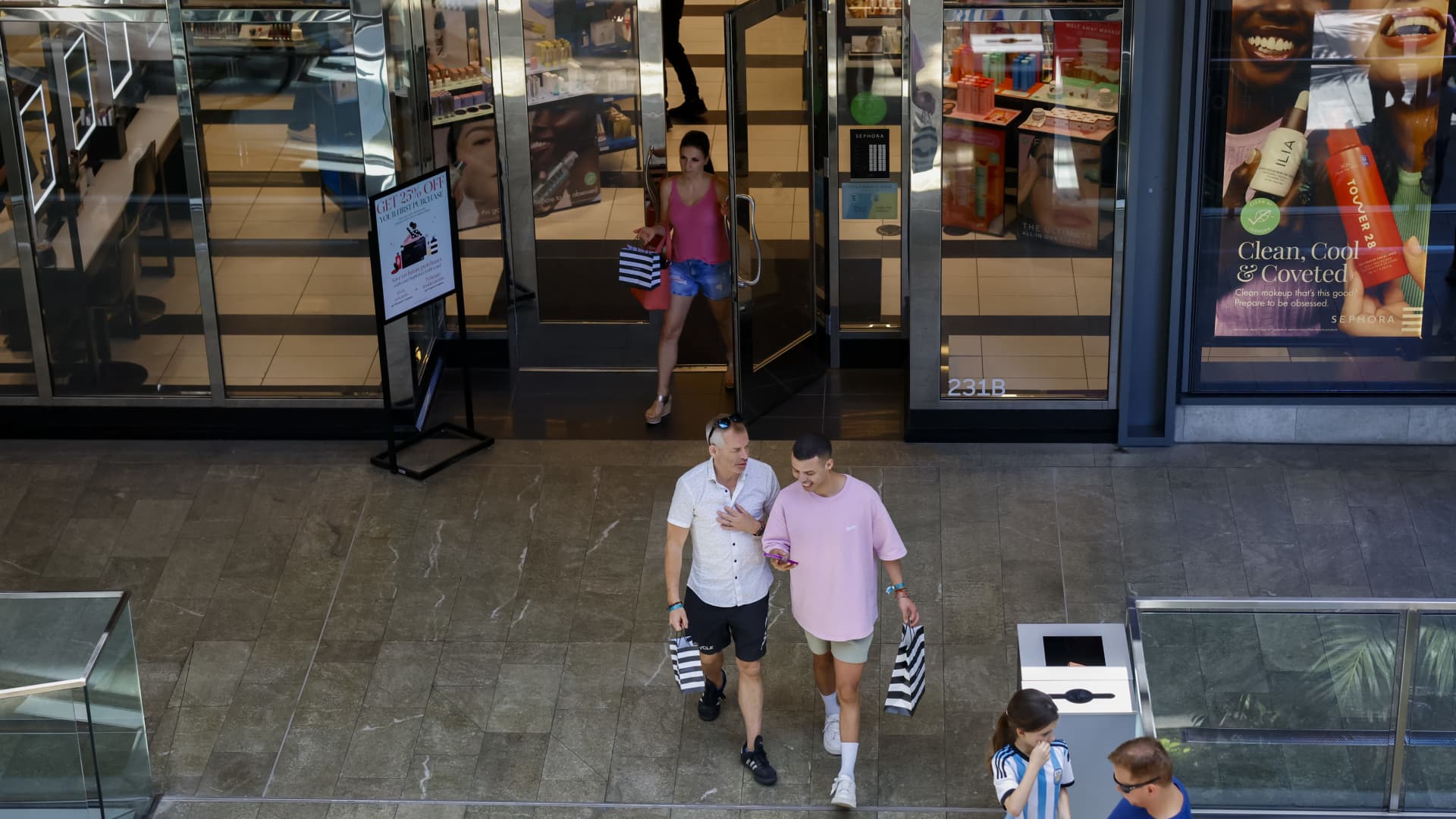
Recent data seems to suggest that Americans have so far been willing to spend , especially as inflation continues to fall. But some companies say customers appear to be cutting back. The implications could be significant, given that consumer spending accounts for about two-thirds of the U.S. economy. On Friday, Jason Ware, chief investment officer at Albion Financial Group, and Brian Stutland, portfolio manager at Equity Armor Investments, presented their bull and bear cases, respectively, on CNBC’s ” Street Signs Asia. ” ‘The consumer is looking pretty good’ Ware said he’s optimistic about the consumer for the near term, describing the “really strong” labor market as the “fountain from which that consumer strength is born.” The July jobs data showed that while nonfarm payrolls rose by 187,000 for the month — slightly below the Dow Jones estimate of 200,000 — it actually represented a modest gain from June. The unemployment rate was 3.5% — just above the lowest level since late 1969 . “The general idea is that the consumer is resilient here in the U.S. We’re seeing that in corporate earnings reports. So that’s where we are right now. And we think that that will continue over the near term until we see the labor market begin to crack and until such time the consumer is looking pretty good,” Ware said. But he’s less bullish about the medium term, saying he believes a recession is still likely to happen. ‘Trouble for the consumer’ Stutland, for his part, agreed that the strong labor market has been key to consumer resilience, but pointed out that rising interest rates are increasingly bad for consumer stocks. Historically, there has been a high negative correlation between the Consumer Discretionary Select Sector SPDR Fund and the U.S. 10-year interest rates. “A rise in 10-year rates, has historically been devastating for consumer and consumer discretionary stocks,” he said. “With the 10-year breaking above 4.25%, we are seeing all those consumer discretionary stocks that have had big years pull back sharply.” Stutland said consumers will need to pay off higher interest rate payments, and if the 10-year rate continues to take off, that’s “trouble for the consumer.” “Investible consumer discretionary stocks need to be big cap, U.S.-based, and an interest rate environment where rates are flat to slightly declining. This makes for a tight needle to win with this sector,” he said. Though Ware concedes that rising rates may spell trouble for those consumer stocks, he said he’s unsure the 4.25% 10-year rate is “going to do much to directly impact economic activity.” Rising credit card debt Americans increasingly turned to their credit cards to make ends meet heading into the summer, sending aggregate balances over $1 trillion for the first time ever , according to a New York Federal Reserve report in early August. Total credit card indebtedness rose by $45 billion in the April-through-June period, an increase of more than 4%, according to the report. Ware said while that data implies a “U.S. consumer that is showing signs of exhaustion,” “the reality is that we see debt grow in accordance with the growth in the U.S. economy.” Cash from pandemic stimulus handouts is dwindling — and that means a shift to credit, he said. “At present really, it’s just wage growth and jobs that are keeping people out there spending so until that changes, it’s hard for me to see the consumer really contracting,” Ware concluded. For Stutland, that consumer strength is keeping him bullish on the stock market and U.S. economy in general — but not consumer discretionary stocks. “I’m staying away from the lower market cap weighted stocks and consumer discretionary from those apparel type brands,” he said. Stocks to buy Stutland said he would own names such as Amazon , Home Depot and Lowe’s . “As a whole, consumer discretionary stocks to invest in are narrowing. They have to [be] big and massive and able to quickly adjust to the rising demand of wages and the bigger the company the easier it is to handle profit margin squeezes,” he said. Ware said his firm also owns Amazon and Home Depot, as well as Starbucks . He added that Visa is also a “great consumer play,” with “pretty good traffic trends and volume.” “You want to stick with the secular consumer growth stories that are going to be multi-year winners,” he said.
